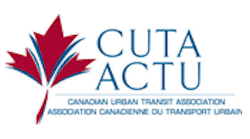Canada’s mayors want federal government to continue funding support of transit
Canada’s mayors and its largest public transit association are asking the federal government to continue emergency transit funding relief in the 2022 federal budget or face “very real impacts” of inaction.
The financial crisis looming among transit services is part of a larger municipal financial crisis brought on by the COVID-19 pandemic, which saw the revenues municipalities rely on to fund transit systems significantly decline. Exacerbating the revenue decline is that Canadian municipalities – unlike provincial and federal levels of government – do not have a legal ability to run operating deficits.
Transit systems across Canada are expecting operating shortfalls in 2022 including:
- C$561 million (US$440.34 million) projected shortfall for the Toronto Transit Commission;
- C$200 million (US$156.98 million) projected shortfall for TransLink in Metro Vancouver;
- C$89 million (US$69.86 million) projected shortfall for Calgary Transit;
- C$53.7 million (US$42.15 million) projected shortfall for the Edmonton Transit Service; and
- C$43 million (US$33.75 million) projected shortfall for Société de transport de Montréal.
The Canadian Urban Transit Association (CUTA) explains transit ridership is down by half with lost transit revenue representing the single biggest revenue shortfall for most cities. CUTA notes 51 percent of transit operations were funded by farebox revenues pre-pandemic. CUTA says for every 10 percent drop in ridership, transit systems lose C$470 million (US$368.9 million) nationwide.
“More than two million people rely on transit every day. But cities won’t be able to keep it running unless Ottawa and the provinces provide more financial support,” said CUTA President Marco D’Angelo. “Cities cannot replace this lost revenue alone and public transit isn’t a nice-to-have. For the people who depend on transit, to meet climate targets and decongest cities, Ottawa needs to keep transit running.”
CUTA points to the C$4.6 billion provided to keep transit running through the Safe Restart Agreement in late 2020, which saw the federal government cost-match certain provincial priorities, which included transit, as Canada, like the rest of the world, grappled with the pandemic’s financial fall out. CUTA notes while these funds provided “unprecedented support,” they have either expired or will soon expire.
Metro Vancouver Mayors’ Council: Difficult decisions loom without additional support
Metro Vancouver’s Mayors’ Council on Regional Transportation issued a letter to federal officials asking the federal government to extend emergency relief to cover operating losses for the remainder of the pandemic.
TransLink limited its service reductions to four percent and has seen a 60 percent ridership return, which is expected to reach 80-90 percent of pre-pandemic levels by the end of 2022. However, the plan to expand services, support economic recovery and contribute to national climate targets are at risk without additional federal support.
“While TransLink’s ridership recovery is out-performing expectations and surpassing most other urban transit systems in North America, we are not immune to the ongoing challenges of the pandemic,” said TransLink CEO Kevin Quinn. “As we head towards a ‘new normal’ for transit ridership – with less revenue coming from transit fares – we will need continued support from senior governments as we work to identify alternative revenue sources.”
“If the federal government doesn’t extend this critical funding, we face making difficult decisions on service levels and future projects or shifting the burden of pandemic-related losses to more regressive local tax sources impacting already hard-hit businesses and residents struggling with affordability challenges,” explained Chair of the Mayors’ Council Mayor Jonathan Cote. “We cannot meet the demand of our growing population over the coming decades and realize the goals set out in Transport 2050 if we sacrifice the integrity of the transit system we have today. What we’re asking is that the federal government continue to step up to support public transit, just like they have for other essential public services impacted by the pandemic.”
FCM Big City Mayors’ Caucus: Inaction has very real impacts
The Federation of Canadian Municipalities (FCM)’s Big City Mayors’ Caucus Chair Mayor Mike Savage and co-chairs Montréal Mayor Valérie Plante and Saskatoon Mayor Charlie Clark issued a statement on Jan. 26, calling on the federal government to cover 2022 transit operating shortfalls and explaining inaction will most hurt those with little to sacrifice.
The statement read in part:
“Public transit is a social, economic and environmental backbone for our cities. For millions of frontline workers and lower-income Canadians, accessible and affordable transit is a critical connection to work, school and essential services. All pandemic long, thanks to our federal partner, we have strived to maintain the transit services that people and businesses need. Federal financial support has been critical for cities facing shortfalls, and we thank the federal government for its leadership—and our provinces for their strong collaboration to this point.
“What’s new here is the very clear urgency. Even before Omicron, most large transit systems were forecasting serious ridership and revenue challenges for 2022. Cities have already made tough decisions--making cuts where they could, laying off staff and raising property taxes. Yet the effects of the pandemic remain with us. With city budgets being finalized now, we simply cannot wait any longer.
“The solution is simple: the federal government and provinces need to make a public commitment to emergency operating support for transit systems as soon as possible. The future of Canada’s public transit is at stake. The only way to resolve this issue is for the federal and provincial governments to come to the table urgently with financial support to cover 2022 operating shortfalls.”
The Big City Mayors explained a future recovery is not possible if services are cut now.
“The consequences of inaction will have very real impacts. Cutting transit service will lead to reduced mobility. Increasing property taxes will limit the economic recovery of our cities. Major user fee increases, or reductions in service quality, will discourage many from riding transit and will place an unfair burden on people who rely on public transit.
“We know all orders of governments understand the stakes. Some provinces, such as Ontario and Quebec, have signaled they are willing to step up to this challenge. Municipal leaders thank all of our partners and we call for others to join us. Above all, federal leadership to address this national issue is essential – and it is urgent for this year. Their early pandemic operating support helped us keep transit services going strong. But pandemic impacts have stretched out longer than anyone forecasts and now we urgently need to adapt.”
Both coalitions of mayors submitted their letters and statements as part of the government of Canada’s pre-budget consultation for 2022/2023. It’s a step in the federal budget process to arrive at a final budget around June.

Mischa Wanek-Libman | Group Editorial Director
Mischa Wanek-Libman is director of communications with Transdev North America. She has more than 20 years of experience working in the transportation industry covering construction projects, engineering challenges, transit and rail operations and best practices.
Wanek-Libman has held top editorial positions at freight rail and public transportation business-to-business publications including as editor-in-chief and editorial director of Mass Transit from 2018-2024. She has been recognized for editorial excellence through her individual work, as well as for collaborative content.
She is an active member of the American Public Transportation Association's Marketing and Communications Committee and served 14 years as a Board Observer on the National Railroad Construction and Maintenance Association (NRC) Board of Directors.
She is a graduate of Drake University in Des Moines, Iowa, where she earned a Bachelor of Arts degree in Journalism and Mass Communication.





